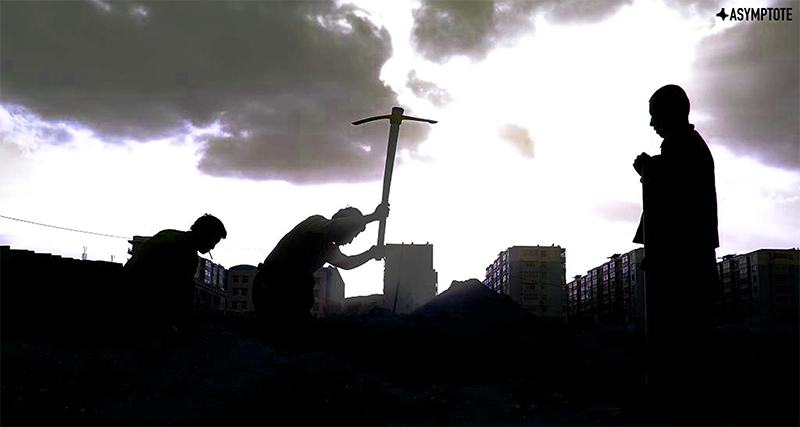Chinese literature has recently experienced a boom of “migrant workers’ writing”—largely autobiographical works produced by individuals involved in the nation’s sprawling gig and service economy. From deliverypersons to housekeepers to drivers, these marginalized laborers reveal in their writing the hardships and intersectional complexities that their positions make them vulnerable to, testifying to the thanklessness and extreme demands of their essential roles, and thus giving a pivotal view as to what constitutes the nation’s varied and persistently hegemonic social fabric. In this essay, Jianan Qian gives background to this rise and its unveiling of public secrets—the truth of what it takes to keep the enormous engine of China humming.
1.
I first heard the voices of the migrant workers not through literary works, but through popular songs. In 2010, a music video of two men singing Wang Feng’s “In the Spring” went viral on Chinese internet; in the shaky images captured by a handheld camera, the singers—later known as the duo Xuriyanggang—stood bare-chested in a cramped rented room. They were tanned, their faces and necks reddish from long hours of outdoor labor. In raw voices, they sang the chorus:
If one day, I grow old
and have nowhere to turn,
Please bury me,
Bury me in the heart of the spring.
In the original music video, Wang—a Beijing native and now an established musician—is looking nostalgically back on the spring of his youth, when he was a nameless music school student dedicated to his dream. The line “having nowhere to turn” sounds melancholic in his voice, perhaps signaling the common anxiety of aging, but in Xuriyanggang’s version, it indicates a future of being aged and homeless, speaking to the literal reality of the migrant workers looking towards it. The hukou, or household registration system in China, restricts its citizens’ access to education, healthcare, and pensions to their place of birth; thus, for many rural-born Chinese whose truncated education have forced them to take up labor jobs in major cities (turning them into “migrant workers”), they may still be deemed illegitimate residents after spending most of their lives in the cities they helped build, and thus are subject to displacement.
2.
Around the same time in the early 2010s, the voices of migrant workers also began to gain attention in the literary world. By committing their raw experiences to writing, they introduced the reading public to a stream of narratives that outline the deprivation, denial, and reduction consequential to the hukou system. Amongst them was Xu Lizhi, a young assembly-line worker at the Foxconn factory in Shenzhen, who recorded his angst in poetry. In one of his most circulated pieces, he wrote:
I swallowed a moon made of iron
They called it a screw
I swallowed the industrial sewage, the unemployment files
and youth cut short by bending over the machines
I swallowed the hustle and the displacement,
the pedestrian overpass, and life overgrown with rust

